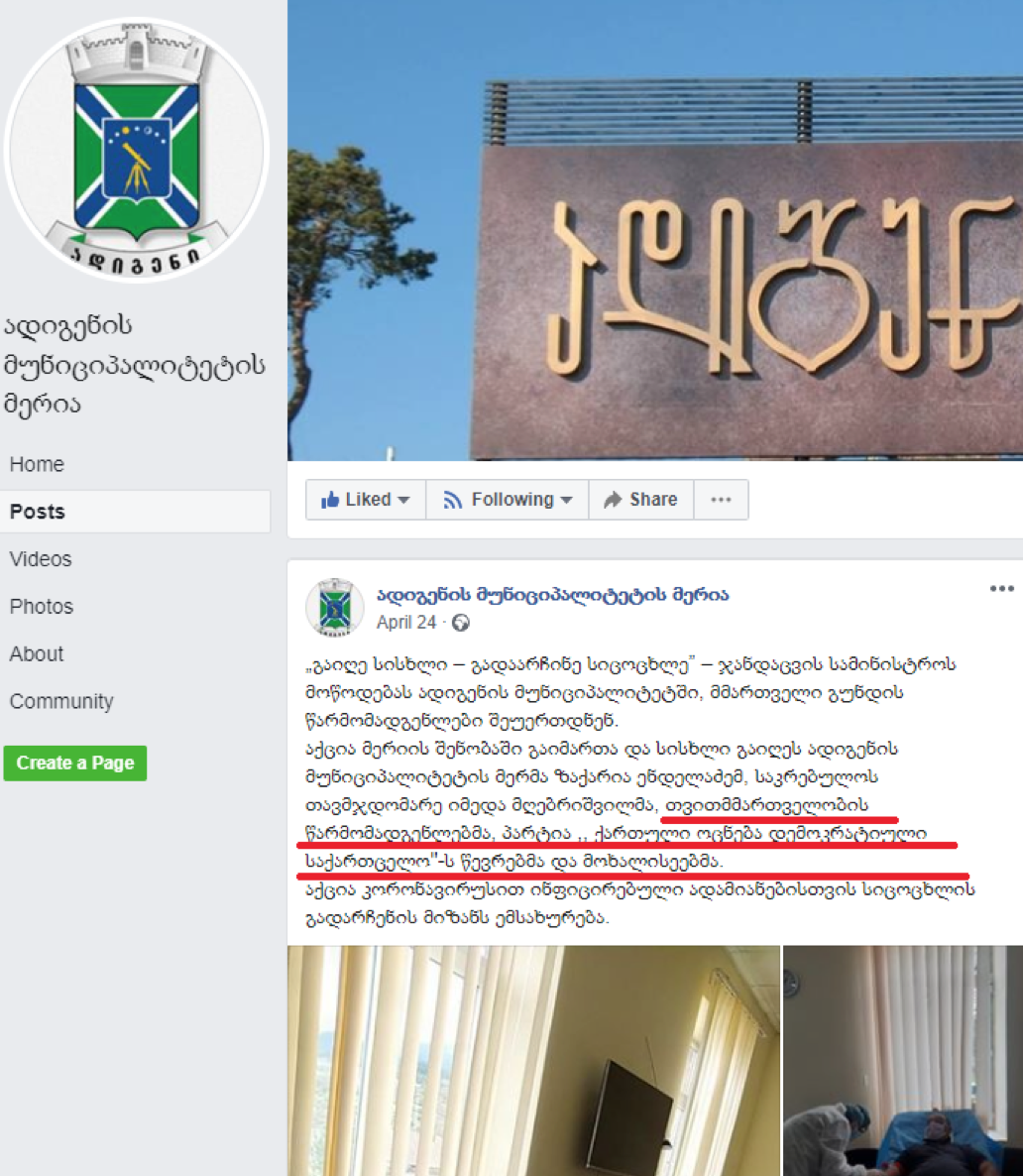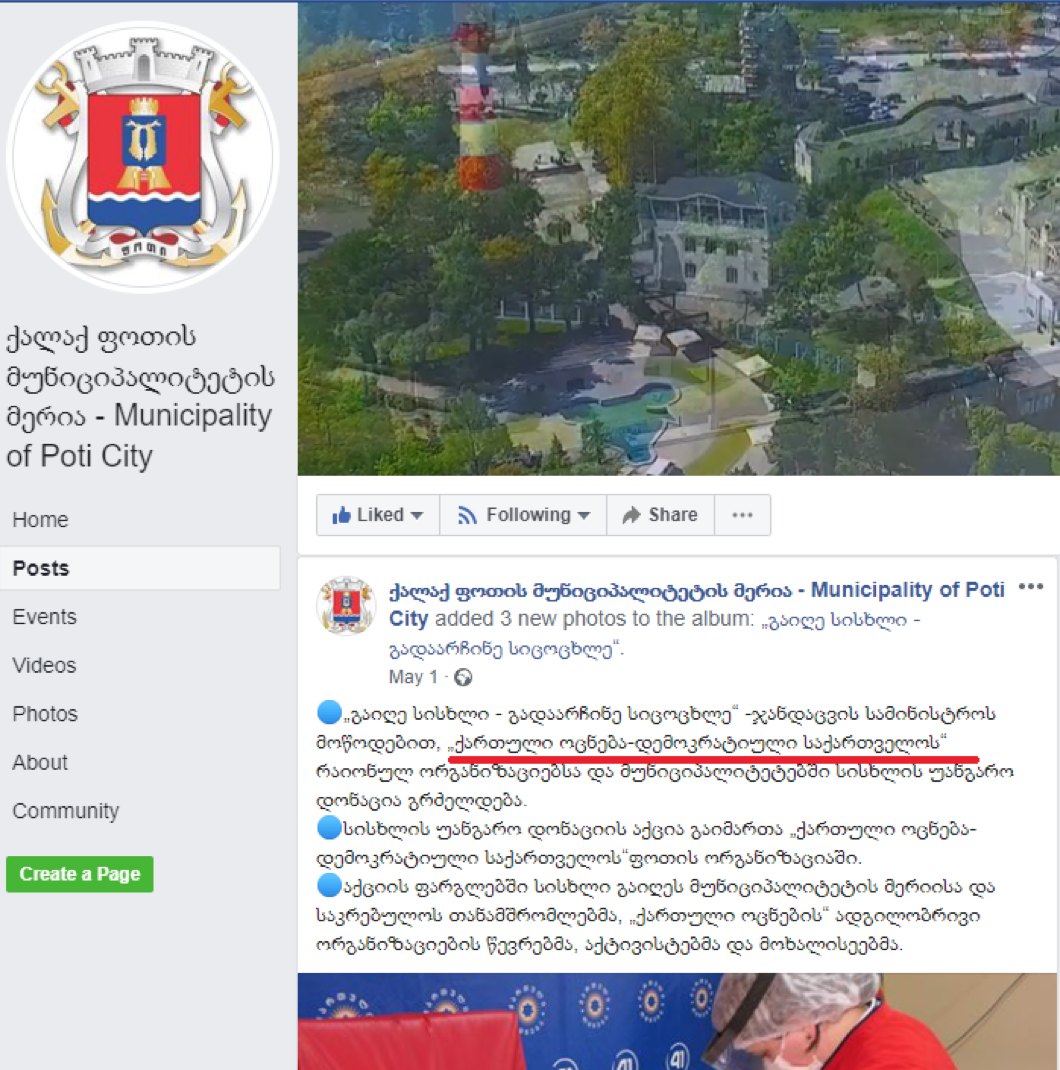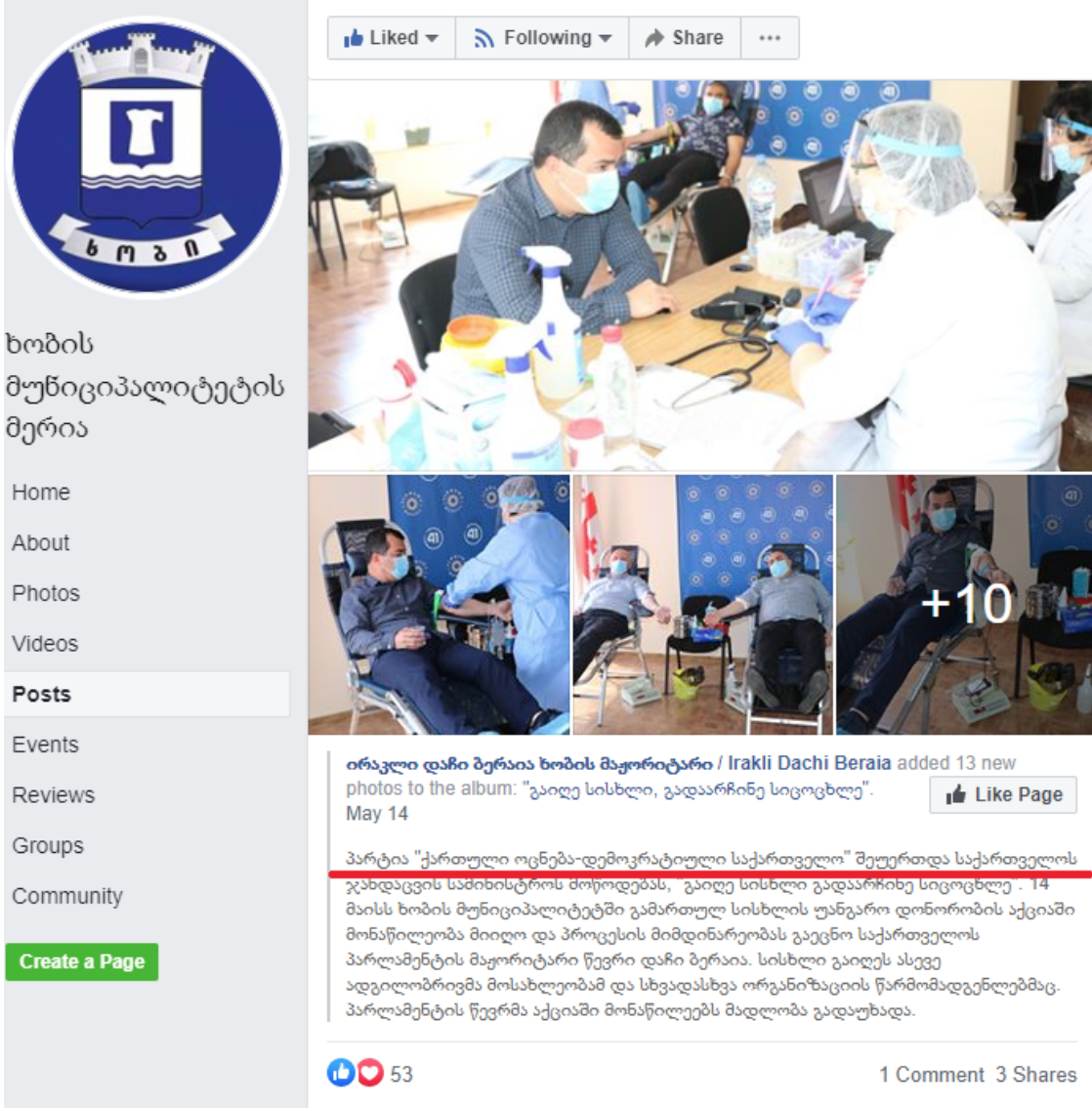The ruling party is increasingly featured on Facebook pages of self-governments
Since April 2020, some local self-government bodies have engaged in campaigning in favor of the ruling party, using their official Facebook pages. In addition, individual municipalities are also involved in campaigning in favor of majoritarian members of the Parliament of Georgia.
ISFED examined 133 official Facebook pages of local self-government bodies, including 69 city hall pages and 64 Sakrebulo (assembly) pages.
Among posts published on Facebook pages of city halls, the Georgian Dream and related information was featured in only 4 posts of Tskaltubo Municipality, published in March, September and December 2019. As to Sakrebulos, among 64 pages 5 published a total of 13 posts about the Georgian Dream.
Dramatic changes took place starting from April 2020, when official pages of Sakrebulos and city halls began to publish posts about the Georgian Dream intensively, making it seem as though they were acting under common instructions.
For instance, in May 2020, Facebook pages of municipality Sakrebulos and city halls published information about a blood donation initiative, underlining that participants included Georgian Dream MPs. Information about Sakrebulo members from other parties was not published.
-----
 |
 |
 |
||
|
Adigeni Municipality City Hall “Donate blood - save a life” - in Adigeni Municipality, members of the ruling party have joined the initiative of the Ministry of Health. The blood-drive took place at the City Hall building. Mayor of Adigeni Municipality Zakaria Endeladze, Sakrebulo Chairperson Imeda Mgebrishvili, self-government representatives, members of the Georgian Dream - Democratic Georgia and volunteers donated blood. The initiative aims to save lives of people infected with coronavirus. |
Poti Municipality City Hall “Donate blood - save a life” - under the initiative of the Ministry of Health, voluntary blood donation continues in regional organizations of the Georgian Dream - Democratic Georgia and municipalities. The blood-drive took place at Poti Organization of the Georgian Dream-Democratic Georgia. Within the initiative, employees of Gori Municipality City Hall and Sakrebulo, members of the local organization of the Georgian Dream, activists and volunteers donated blood. |
Irakli Dachi Beraia Khobi Majoritarian MP The Georgian Dream - Democratic Georgia joined the initiative of the Ministry of Health of Georgia, “Donate blood - save a life”. On May 14, Majoritarian Member of the Georgian Parliament Dachi Beraia participated in the blood-drive and familiarized himself with the process. Blood was also donated by locals and representatives of different organizations. The MP thanked everyone for participating in the initiative. |
-----
From January 2020 to present, the Georgian Dream was referenced in neutral or positive context 29 times in posts published by official Facebook pages of 20 municipality city halls, while Sakrebulos published 54 such posts. The name of the party was often used in the context of Sakrebulo members’ affiliation, however such practice didn’t exist before.
Notably, posts published on these pages do not concern other political parties or candidates, even though Sakrebulo members also include members of other political parties.
As the elections draw near, such activity of official Facebook pages of municipalities runs against the principle of drawing a clear line between the State and political party and increases the risks of abusing administrative resources in favor of the party.
Notably, during the 2018 presidential election, targets of social media monitoring by ISFED included official Facebook pages of local self-governments. The monitoring revealed that with only a few exceptions, web and social media platforms of self-governments (websites and Facebook pages) were not used for political purposes and their goal was to inform constituents about activities of local self-government, which was a good example of accountability. However, the recent trend - dissemination of information about activities of the ruling party and majoritarian MPs constitutes violation of political neutrality by information platforms of municipalities and misuse of administrative resources.
According to the Election Code, official pre-election campaign begins 60 days before the elections and restrictions concerning the use of administrative resources, provided in the Election Code of Georgia, are effective during this period. However, in addition to national legislation, use of administrative resources for electoral purposes should also be interpreted according to applicable international principles. In that respect, the standard established by the OSCE Copenhagen Document (1990) is crucial - equal access to public resources for political parties and a clear line between the state and political party.[1]
Legitimate activities of authorities should be separated from ruling party activities, especially during the election process. Legal and ethical standards should be implemented in a way that makes it possible to clearly distinguish activities of local self-governments from party activities. Therefore, local representative and executive authorities should refrain from covert advertisement of the ruling party Georgian Dream on their official social media platforms, in connection to municipality activities.
The report is prepared based on openly available sources on Facebook. Assessment of the personal accounts (profiles) stems from their public activity only. CrowdTangle, a social media analytics tool owned by Facebook, was used as a monitoring tool.
ISFED’s social media monitoring program is carried out with the generous support from the American people through financial assistance from the United States Agency for International Development (USAID), East-West Management Institute’s (EWMI) ACCESS Project, and through funding from Open Society Georgia Foundation (OSGF). Content of this report is the sole responsibility of the International Society for Fair Elections and Democracy and may not necessarily reflect the views of the donor organizations.
-----
[1] Articles 5.4 and 7.6, Copenhagen Document of 1990

